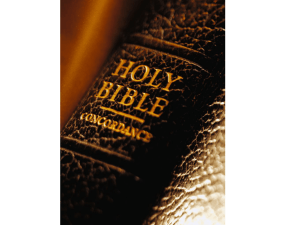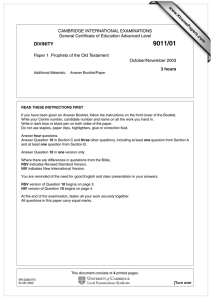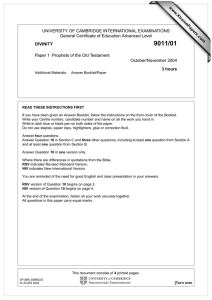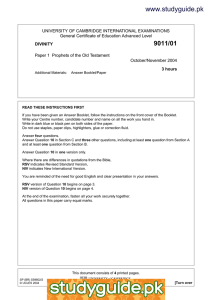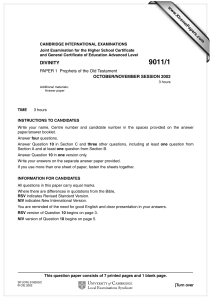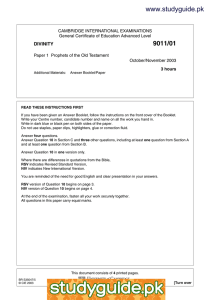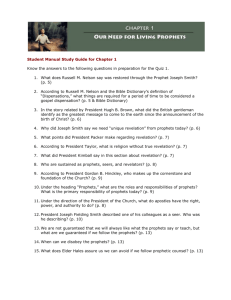9011 DIVINITY MARK SCHEME for the October/November 2012 series
advertisement
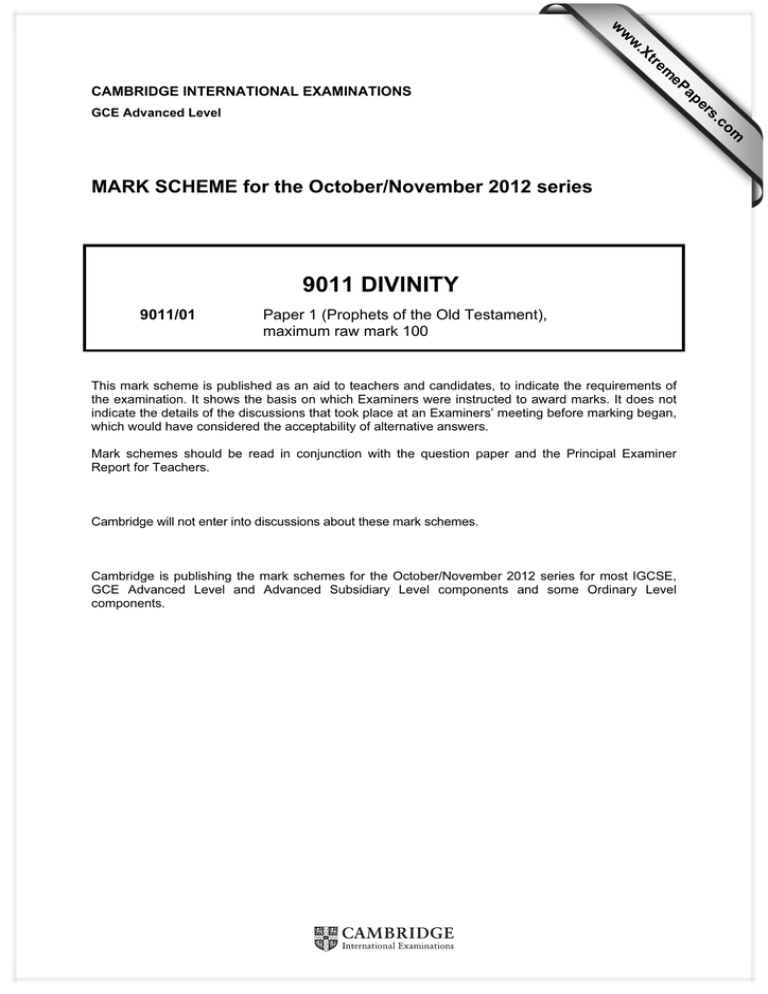
w w ap eP m e tr .X w CAMBRIDGE INTERNATIONAL EXAMINATIONS s er om .c GCE Advanced Level MARK SCHEME for the October/November 2012 series 9011 DIVINITY 9011/01 Paper 1 (Prophets of the Old Testament), maximum raw mark 100 This mark scheme is published as an aid to teachers and candidates, to indicate the requirements of the examination. It shows the basis on which Examiners were instructed to award marks. It does not indicate the details of the discussions that took place at an Examiners’ meeting before marking began, which would have considered the acceptability of alternative answers. Mark schemes should be read in conjunction with the question paper and the Principal Examiner Report for Teachers. Cambridge will not enter into discussions about these mark schemes. Cambridge is publishing the mark schemes for the October/November 2012 series for most IGCSE, GCE Advanced Level and Advanced Subsidiary Level components and some Ordinary Level components. Page 2 Mark Scheme GCE A LEVEL – October/November 2012 Syllabus 9011 Paper 01 Section A Prophecy in general and Pre-canonical Prophets 1 Examine the ways in which pre-canonical prophets delivered their messages. There is no required balance between the potential components of candidates’ answers. Candidates are likely to refer to some of the following: • • • • • • • • • the prophetic messenger formulae: Thus says Yahweh / Oracle of Yahweh, etc., and may be able to give appropriate examples examples of what prophets do in order to deliver their messages, as for example with Moses’ role in mediating law, in the narrative of Elijah at Carmel, the incident of the ‘lying spirit’ of prophecy in 1 Kings 22, and so on the role of ecstasy, with appropriate examples reference to visions and auditions, e.g. as in the call narratives discussion of nabi, roeh, hozeh, and what these titles signify prophetic priestly functions, for example with Samuel – i.e. prophets could deliver their messages whilst acting as priests, whilst delivering urim & tummim, or as cultic prophets (as in the Saul / Samuel narrative) symbolic acts and symbolic visions prediction, as in the Samuel / Saul narrative of the lost asses blessings and curses (e.g. Balak & Balaam) Credit more generalised answers which talk about the effectiveness of prophetic techniques as a whole, since the question could be taken in that way. Candidates can be relevant by referring to anything that the prophets did whilst acting on behalf of Yahweh, and that covers a wide range of material; so mark accordingly. 2 Discuss the view that there was no clear difference between ‘true’ and ‘false’ prophets in Ancient Israel. The OT contains several references to attempts to separate true from false prophets. Candidates might refer to some of the following: • • • • • a true prophet (TP) / true prophets (TPs) differed from a false prophet (FP) / false prophets (FPs) in that FPs functioned at the court, and flattered the king. This does not work – Nathan was fair in his dealings with David; Isaiah behaved evenly with the kings with whom he had to deal. There are no general accusations that prophets were false because of their association with the king FPs = cultic prophets. This does not work, either. Again, there are no general accusations that prophets were false because of their association with the cult. Moses operated as a cultic functionary; so did Samuel; Hosea was possibly a cultic functionary; there are several scholars who assert that all prophets were cultic functionaries Some assert that the FPs prophesied for money (cf. Micah 3:5), but Samuel was a paid seer Jeremiah gives several distinctions between FPs and TPs: the former indulge in willful deception (8:10); FPs are not sent by Yahweh, prophesy lies in his name, and teach the deceit of their own minds, and do not prophesy sword or famine (14:13–15); FPs are immoral (23:14). These criteria might serve to say what a FP is, but they do not seem to have been clear to people at the time, otherwise they would not have been deceived TPs spoke from conviction; FPs did not. This does not work: both Hananiah (Jer. 28) and Zedekiah (1 Kings 22) spoke with conviction, but still gave false messages (albeit for different reasons) © Cambridge International Examinations 2012 Page 3 • • • • • • Mark Scheme GCE A LEVEL – October/November 2012 Syllabus 9011 Paper 01 TPs had a call; FPs did not. We do not know that FPs did not have a call – some may have believed that they did; moreover we do not know that all TPs had a call TPs used prophetic messenger formulae. These were also used by FPs: e.g. Jer. 23:31; 1 Kings 22:10 FPs prophesy peace, whereas TPs prophesy doom. Jeremiah asserts this in 6:14; 28:8–9. Some might reject this as a distinction, since Isaiah used salvation oracles (e.g. Isa.7), and even Amos has salvation oracles at the end. Others might see this as a clearer ground for distinction, since the salvation oracles in the Book of the Twelve are arguably all editorial additions The word of TPs was fulfilled whereas that of FPs was not. This is found in Deut. 18:22 (preceded by a death threat to prophets who speak in the name of other gods, or in Yahweh’s name without being commanded by him); cf. Jer. 29:9; 1 Kings 22:28. The problem is that fulfilment as a criterion is weak, since it is generally held that the fulfilment of some true prophecy lies in the future; also, fulfilment as a criterion refers only to the predictive element in prophecy, which is only a small part of it Some hold that TPs did not use ecstasy; but others hold that they did The whole issue is complicated by 1 Kings 22 – the narrative of the confrontation between Micaiah ben Imlah on the one hand, and Zedekiah ben Chena’anah and the 400 court prophets on the other – since the editors of this passage are presumably explaining the phenomenon of false prophecy by suggesting that it is controlled by Yahweh, who summons a ‘spirit of lying prophecy’ to deceive Ahab, so false prophecy is therefore as ‘true’ as ‘true’ prophecy. This raises all sorts of issues that candidates might be able to discuss. For access to the higher marks, candidates should address the word ‘clear’. 3 Compare and contrast Moses’ roles as a leader and a prophet. Most candidates are likely to justify Moses’ status as a prophet from: • • • • • • • his call and commission miraculous power in delivering the slaves intercessory functions use of prophetic formulae fearlessness in executing Yahweh’s commands mediation of the Sinai covenant as binding on future prophets the Deuteronomic assessment of Moses as a prophet / the incident with the 70 elders, etc. Candidates should be able to show Moses’ leadership qualities in most of these situations. For access to the higher marks, candidates should comment on the comparative aspect of the question: • • • some might claim that Moses’ status as a leader derived naturally from his status as a prophet also, the nature of his call required him to act in a leader’s capacity some might argue that he was more of a leader because there is evidence of intense editorial activity in connection with the OT portrait of Moses, which is idealized and anachronistic (e.g. Numbers 11). © Cambridge International Examinations 2012 Page 4 4 Mark Scheme GCE A LEVEL – October/November 2012 Syllabus 9011 Paper 01 ‘More than any other figure, he kept Yahweh worship alive in Israel.’ In your view, is this more true of Samuel, or of Elijah? Samuel lived in a time of radical change, and was at the centre of it, so candidates might make some of the following judgements: • • • • • • • the Samuel narrative begins with a note that the word of Yahweh was “rare in those days” (1 Samuel 3:1), so it was Samuel who revived it Samuel engineered the change from amphictyony to monarchy. The rise of the monarchy can be seen as a political necessity in response to the Philistine threat. Israel might have ceased to be a nation had the Philistines conquered their territories, in which case Yahweh worship would have ceased also the circumstances of Samuel’s birth & call suggest that he had a particularly special prophetic mission. Eli’s house was too corrupt to pursue such a mission Samuel seems to have been involved in the development of the role of seer into that of the nabi: 1 Sam.9, in which case his developed prophetic status was perhaps given to him in order to help him cope with the affairs of Israel Samuel as adviser to Saul: his developmental role in the instigation of court prophecy credit details about Samuel as war leader (and hence preserver of Yahwism) some might argue that the multiple roles he played underline his status, and again show his fitness for the task of preserving Yahwism Elijah had archetypal importance, e.g. at Sinai in connection with election, covenant, salvation, law, revelation of God, etc. • • • • • • • • as with Samuel, Elijah revived contact with God and vision his dealings with Ahab and Jezebel, and the threat to Yahwism from worship of Baal & Asherim the power of Yahweh manifested in the drought the contest on Carmel and the destruction of the Baal prophets, establishing that Yahweh, and not Baal, is Lord of the heavens the importance of his mission demonstrated in the very unusual theophany, restoring proportion the importance of Elijah generally: e.g. his wonder–working ability / translation to heaven / messianic associations in later Judaism Elijah’s concerns for social justice as a focal aspect of Yahweh-worship (1 Kings 21) the transfer of his prophetic role to Elisha, continuing the prophetic control over kingship, thus seeking to guarantee the preservation of Yahweh worship. To access the higher marks, candidates will need to address the comparative element of the question. © Cambridge International Examinations 2012 Page 5 5 Mark Scheme GCE A LEVEL – October/November 2012 Syllabus 9011 Paper 01 ‘The actions of pre-canonical prophets led to the deaths of so many people that we cannot regard these prophets as good men.’ Examine this view. Candidates are likely to illustrate the propensity of the pre-canonical prophets to exterminate their opponents, e.g. • • • • • • • • • Moses and the death of the first-born / the elimination of Pharaoh’s army by drowning them in the miracle of the Exodus Samuel’s dealings with the Philistines and with Saul, e.g. his rejection of Saul for not prosecuting the war with Israel’s enemies with sufficient intensity, sparing Agag and some animals (1 Samuel 15) Elijah and the extermination of the prophets of Ahab and Jezebel Nathan’s announcement to David that his baby son will die because of David’s sin (2 Samuel 12:14) some narratives appear to have inexplicable cruelty, e.g. 2 Kings 2:23–25, where Elijah summons two she-bears from the woods to maul to death 42 boys merely for calling him ‘baldhead’ whichever narratives are selected as illustrative of the pre-canonical prophets causing the death of many people, candidates should assess whether such actions can justifiably be regarded as “good” some might argue that goodness involves obeying the commands of Yahweh, so on that criterion, the pre-canonical prophets were good others might argue that some or all of these actions were either unnecessary or were an over-reaction. Most people today, for example, would see Saul’s clemency in 1 Samuel 15 as being preferable to the required extermination programme it would also be appropriate for candidates to make general comments about the inevitability of the prophets being involved in war and violence, since their calling was unavoidably linked to the political situation at the time, and the history of the Ancient Near East is the history of war and violence. This does not mean that they were necessarily warlike or violent personally. © Cambridge International Examinations 2012 Page 6 Mark Scheme GCE A LEVEL – October/November 2012 Syllabus 9011 Paper 01 Section B Pre-exilic Prophets, with special reference to Amos, Hosea, Isaiah of Jerusalem and Jeremiah 6 Explain why those who heard the prophecies of Amos found his message so hard to accept. Candidates might raise some of the following points: • • • • • • • • 7 Amos came from the South to prophesy in the North. His intervention in northern affairs was probably seen as intrusive and unwarranted his status as a shepherd would probably have made his message appear to be a presumption when addressed to the royal court alternatively, his appearance at the royal shrine of Bethel might mean that he was a cultic functionary who had turned against the system, which would have been shocking to his hearers his criticisms of life in the Northern Kingdom were addressed to Jeroboam II, under whose rule Israel attained a height of territorial expansion and national prosperity never again achieved. Military security and the economic wealth that accompanied it were taken by many as a sign of Yahweh’s favour, since wealth was seen as a sign of the gods’ approval, and poverty as a sign of the reverse. The people could not, therefore, understand Amos’ criticisms of their lifestyle there was an assumption, based on election theology, that God’s chosen people would be exempt from punishment. Amos announced that this was not the case, and that covenant privilege required covenant responsibility, without which destruction would follow Amos was the first prophet to announce the total destruction of Israel Amos contradicted the traditional interpretation of the ‘Day of the Lord’ as being a day of Yahweh’s vengeance on Israel for its sins, rather than a day of vindication for Israel Amos’ portrayal of Yahweh’s universalism, in terms of God’s control over the nations, would have been new territory for those who heard him. In your view, what was the biggest influence on the prophecies of Hosea? The question asks for the ‘biggest influence’, so in order to achieve the highest marks, candidates must refer to more than one influence. They might include some of the following: • • • • • • The nature of the covenant obligation. Hosea employs the ‘covenant lawsuit’ form (e.g. 4:1– 3) to show that God’s judgement is upon Israel. Priests and prophets have rejected the knowledge and teachings of God, and have infected the people with the same malaise. The sins of which Israel stands accused are primarily a rejection of the Ten Commandments, which are the centre of covenant obligation. Israel has lost the purity of the wilderness period Hosea’s issues with Israel are expressed through the story of his relationship with Gomer, and candidates are likely to suggest that Hosea’s marital relationship was the biggest influence on his prophecies, however this influence is to be understood, i.e. as a parable, a real-terms comparison, an allegory, and so on in the same connection, Hosea’s children / his entire familial relationships are an extension of the marital metaphor, particularly in the naming and re-naming of the children another influence to be identified in the story of Hosea is the likely cultic background, i.e. Gomer’s status as (possibly) a cultic prostitute, and (again, possibly) Hosea’s cultic involvement some might refer to the compulsion from Yahweh to prophesy: “Go, take to yourself …” (1:2) Hosea’s major theme with regard to Yahweh is his hesed – his redeeming love, through which he allures Israel/Gomer into the wilderness in order to renew the relationship © Cambridge International Examinations 2012 Page 7 • • • Mark Scheme GCE A LEVEL – October/November 2012 Syllabus 9011 Paper 01 Hosea also refers to God’s love as that of a father for his son alongside the idea of redemptive love, Hosea also emphasizes the theme of God’s punishment of Israel: punishment comes before restoration, and this theme was probably influenced by the political situation the political situation of the day was obviously a major influence on Hosea, since Israel was suffering from the effects of war with Assyria, and was in a state of near-anarchy. After the conquest of 733–32, four Israelite kings were assassinated in 15 years (cf. 4:2 – “murder follows murder”), and Samaria fell to the Assyrians in 721. In order to access the higher marks, candidates should make some answer to the question of which was the biggest influence on Hosea’s prophecies. Credit the logic of any answer. 8 Discuss the view that Jeremiah had many different sides to his character. Candidates are likely to treat this question in terms of the different things that Jeremiah did, as illustrative of the different sides to his character. They might mention some of the following points: • • • • • • • • • • • • at his call, Jeremiah displayed hesitation, dismay and modesty his family had a priestly background. There are several details in the book which suggest that Jeremiah inherited this part of the family duties, e.g. his Temple Sermon. he appears to have had ecstatic visions / experiences, for example his call narrative he was a visionary in general (e.g. the basket of figs, 24:1-10) he had a marked tendency to perform symbolic acts he was a magnificent poet, not least in the ‘confessional’ material some scholars think that the ‘I’ of his ‘confessions’ is cultic, and that he is thereby operating as a cultic prophet – a paid functionary who gave professional responses to a lament offered in a cultic context he appears to have had a morbid side to his nature, suggested both by the ‘confessions’ and by the general details of his life, such as his withdrawal from family and social life he had a deeply personal relationship with Yahweh, illustrated by the words he addresses to God he was heavily involved with the history and politics of his time, e.g. perhaps with Josiah’s reform; the Temple sermon; involvement with royalty; the Babylonian crisis / deportations; his removal to Egypt his international concerns, seen for example in his oracle against foreign nations the charge that he was a traitor / the insistence that he was really a patriot. Credit these and other suggestions to show character diversity. Credit also attempts to show unity of personality. Some candidates might relate diversity to editorial activity, although this would be an exceptionally high level of a comment. © Cambridge International Examinations 2012 Page 8 9 Mark Scheme GCE A LEVEL – October/November 2012 Syllabus 9011 Paper 01 ‘There was no real difference between pre-exilic and pre-canonical prophets.’ How true is this claim? Some might disagree: • • • • • • they might claim that the work of the pre-canonical prophets was seminal for those who came later, so there was a difference of importance, for example in so far as the precanonical prophets established the Sinai covenant some will claim that the pre-canonical prophets were miracle workers whereas the pre-exilic prophets generally were not, at least not to the same degree some will argue that prophets like Moses, Samuel and Elijah were multi-functional in a way that the pre-exilic prophets were not pre-exilic prophets issued a scale of threat not seen in the words of the pre-canonical prophets, especially Amos, whose threat of doom was total, or close to it pre-exilic prophets were different by the very fact that their oracles became canonical in connection with the books that bear their name. Some might see this as a mere fact of developmental history pre-exilic prophets sometimes used salvation oracles in a way not seen in the pre-canonical prophets Some will agree: • • • • • • • all prophets can be said to have possessed the ability and determination to deliver Yahweh’s word regardless of the consequences (expect examples) both pre-canonical and pre-exilic prophets appear to have had calls (examples) both groups exercised a check on the power of the king both criticised priests and false prophets (as well as the king) for covenant disobedience candidates might make various claims about ecstatic behaviour for both groups both groups received bad treatment at the hands of the authorities both used oracular messenger formulae. Candidates are likely to develop a range of differences and similarities. Those who argue in favour of the statement are likely to claim that differences are merely owing to historical and background circumstances, and that all prophets are unified in their being mouthpieces for the will of Yahweh. Accept any attempt to make a logical case in connection with the question. © Cambridge International Examinations 2012 Page 9 Mark Scheme GCE A LEVEL – October/November 2012 Syllabus 9011 Paper 01 Section C REVISED STANDARD VERSION 10 Comment on points of interest or difficulty in four of the following passages (wherever possible answers should refer to the context of the passage but should not retell the story from which the passage is taken): (a) I will raise up for them a prophet like you from among their brethren; and I will put my words in his mouth, and he shall speak to them all that I command him. (Deuteronomy 18:18) This is a speech from Moses, confirming (cf. verse 15) the alternative to the divinatory methods that have been condemned – God will raise up prophetic spokesmen instead, to proclaim his will. Candidates might comment on some of the following: • • • • • • • accept a statement of Mosaic qualities that are supposed to have made him archetypal as a prophet, such as his call, mission, miracle-working, intercessory function, leadership qualities, etc. verse 18 repeats verse 14, with the added threat of punishment from Yahweh for those who do not listen the gobbet gives the distinguishing marks of true prophecy: it must be consistent with Mosaic Yahwism / must come from an Israelite, not a foreigner / must come to pass to be regarded as legitimate / death is threatened for false prophets who presume to speak in Yahweh’s name fulfilment is given as the test of a true prophet, in 20–22 accept discussion of the problems associated with these criteria accept reference to false prophets such as Hananiah the overall portrait of Moses as the fountainhead of prophecy, and the prototype of the true prophet (34:10–11) is presumably read back into the narrative, and some candidates may comment on the possibility of anachronism. (b) And I will appoint a place for my people Israel, and will plant them, that they may dwell in their own place, and be disturbed no more; and violent men shall afflict them no more, as formerly, from the time that I appointed judges over my people Israel; and I will give you rest from all your enemies. Moreover the LORD declares to you that the LORD will make you a house. When your days are fulfilled and you lie down with your fathers, I will raise up your offspring after you, who shall come forth from your body, and I will establish his kingdom. He shall build a house for my name, and I will establish the throne of his kingdom for ever. (2 Samuel 7:10–13) The context is Nathan’s oracle to David, as part of David’s desire to build the Temple. Accept comment on some of the following: • the word-play on the various meanings of ‘house’, e.g. ‘palace’, ‘temple’, ‘dynasty’, even ‘family status’ in verse 18. In verse 13 here it means ‘temple’ • the previous claim of verse 6: ‘I have not dwelt in a house …’ ignores the temple at Shiloh (1 Samuel 1:7; 3:3) • the promise is the basis for the theology of the dynasty of David, the Temple, and Jerusalem, all of which are central later in the theology of Judah • the narrative in 7:1–29 is often seen as a late theological commentary seeking to explain why David was not chosen to build the Temple • The language may be based in part on Psalm 89. Cf. Psalm 132:11–12 • accept comment on Nathan, e.g. as a court prophet yet a true prophet © Cambridge International Examinations 2012 Page 10 • • Mark Scheme GCE A LEVEL – October/November 2012 Syllabus 9011 Paper 01 historically, David’s dynasty was not everlasting – it was destroyed in 587 / 586 the reference to ‘violent men’ and the judges recalls the pre-monarchical period when Israel fought for survival, contrasted now with promises of stability. (c) …And behold, there came a voice to him, and said, “What are you doing here, Elijah?” He said, “I have been very jealous for the LORD the God of hosts; for the people of Israel have forsaken thy covenant, thrown down thy altars, and slain thy prophets with the sword; and I, even I only, am left; and they seek my life, to take it away.” And the LORD said to him, “Go, return on your way to the wilderness of Damascus; and when you arrive, you shall anoint Hazael to be king over Syria; and Jehu the son of Nimshi you shall anoint to be king over Israel; and Elisha the son of Shaphat of Abel-meholah you shall anoint to be prophet in your place. (1 Kings 19:13b–16) The context is the revelation to Elijah on Horeb. Candidates might comment on some of the following: • • • • • • • • • • • the background in the confrontation between Elijah on the one hand and Ahab / Jezebel on the other / the contest on Carmel and destruction of the Baal prophets Elijah, afraid of Jezebel’s counter-measures, suddenly finds himself 130 miles south of Jezreel, well within Judah; and subsequently arrives, with divine help, at Horeb comment on the significance of Horeb / Sinai. Candidates might identify Horeb as northern tradition, Sinai as southern; comparison with the Moses narratives the narrative continues with the theophany and the command to anoint Hazael, Jehu and Elisha the voice (described as ‘still’ and ‘small’ in v.12) is usually taken as approval of quieter (non-orgiastic) forms of ecstasy ‘What are you doing here?’ is rhetorical, and serves to introduce the subject of Elijah’s fear for his life it is an open question of why Elijah should be afraid, having vanquished several hundreds of the Baal prophets some may compare this / see it thematically, in connection with prophetic fear and reluctance in other situations the ‘wilderness of Damascus’ means the Syrian desert anointing kings – expect comment on this as an expected prophetic function expect comment on the transfer of Elijah’s prophetic status to Elisha © Cambridge International Examinations 2012 Page 11 Mark Scheme GCE A LEVEL – October/November 2012 Syllabus 9011 Paper 01 (d) And the king of Israel said, “Seize Micaiah, and take him back to Amon the governor of the city and to Joash the king’s son; and say, ‘Thus says the king, “Put this fellow in prison, and feed him with scant fare of bread and water, until I come in peace.” ’ ” And Micaiah said, “If you return in peace, the LORD has not spoken by me.” And he said, “Hear, all you peoples!” So the king of Israel and Jehoshaphat the king of Judah went up to Ramothgilead. (1 Kings 22:26–29) The context is the death of Ahab in battle, the reign of Jehoshaphat in Judah, and the accession of Ahaziah in Israel. Accept comment on any aspects of the historical background: verses 1–40 continue the story of the Aramean / Syrian wars from chapter 20. Syria and Israel had had three years of peace, during which Syria and Israel had made an alliance. The alliance had been successful, along with other allies, in resisting the invading Assyrians at the battle of Qarqar (853). Ahab now allies with Jehoshaphat of Judah, cementing the alliance with a marriage arrangement for his daughter. Ahab persuades Jehoshaphat to recapture the disputed town of Ramoth-gilead, east of the Jordan. Before the raid, they seek God’s approval through the prophets, so Ahab gathers together 400 court prophets, who approve the venture. Jehoshaphat thinks this too glib, so asks if there is another “prophet of the LORD” from whom they can enquire. Micaiah ben Imlah arrives, predicts success, but on being pressed by Ahab admits that the venture will fail. He details a vision of the heavenly court in which Yahweh asks one of the court to “entice” Ahab so that he will die at Ramoth-gilead. A member of the court volunteers to be a spirit of lying prophecy, and succeeds in persuading the campaign to go ahead. Further comment might include: • • • • • the nature of true prophecy and false prophecy, given the fact that Yahweh decides to entice Ahab Zedekiah, who assumes he is a true prophet, and in the circumstances seems justified in claiming to be so the lying spirit developed into the figure of the satan ‘the king’s son’ refers to one of Ahab’s own sons, presumably for additional security the predicted return of Ahab ‘in peace’ is a satirical reference to ‘shalom’ prophecy, and is negated by the fact that Ahab dies in the battle: predicted by Micaiah’s laconic comment, ‘If you return in peace, the LORD has not spoken by me.’ © Cambridge International Examinations 2012 Page 12 Mark Scheme GCE A LEVEL – October/November 2012 (e) In that day the fair virgins and the young men shall faint for thirst. Those who swear by Ashimah of Samaria, and say, “As thy god lives, O Dan,” and, “As the way of Beer-sheba lives,” they shall fall, and never rise again. Syllabus 9011 Paper 01 (Amos 8:13–14) The context is the indictment of Israel, following Amos’ 4th vision of the basket of ripe summer fruits. Amos comments on the merchants who are impatient for the holy days to end so that they can go back to fraudulent business methods. Such behaviour will lead to national mourning as for an only son; also a famine, not of food and water, but of hearing Yahweh’s word. Candidates might comment on some of the following: • • • • • ‘In that day’ uses the language of the expected ‘Day of the LORD’ ‘fair virgins and young men’ means the most desirable / best elements of the population a second connotation of ‘fair virgins and young men’ is that they represent the future of Israel. They are to ‘faint / fall / never rise again’ – so Israel will never rise again either. The death of the Northern Kingdom is predicted in stark language expect no comment on Ashimah (the ‘sin’ of Samaria, unless the word represents Ashimat, from the name of a Syrian goddess). The point of the reference is that Dan is furthest north, and Beersheba furthest south, so the reference is a hyperbole meaning ‘the whole lot’ accept general references to pagan deities of shrines in Beersheba, etc. (f) Return, O Israel, to the LORD your God, for you have stumbled because of your iniquity. Take with you words and return to the LORD; say to him, “Take away all iniquity; accept that which is good and we will render the fruit of our lips. Assyria shall not save us, we will not ride upon horses; and we will say no more, ‘Our God,’ to the work of our hands. In thee the orphan finds mercy.” (Hosea 14:1–3) The context is the closing section of Hosea, in which Israel is invited to return to Yahweh. Candidates might refer to some of the following points: • • • there is a stark contrast between ch.13 and ch.14. Hosea frequently juxtaposes good news with bad news, but the contrast here is much more marked. In this respect it mirrors the end of the Book of Amos, where, as here, the material appears to be editorial – an aspect of a general editing of the Book of the Twelve. verses 1–7 are liturgical in form: 1–3 is confessional; 4–7 offers absolution in verses 1–3, 1–2a are a command to Israel, presumably delivered through Hosea. The command to ‘take with you words’ refers to the words of the confession they are required to make to Yahweh. © Cambridge International Examinations 2012 Page 13 • • • • • • Mark Scheme GCE A LEVEL – October/November 2012 Syllabus 9011 Paper 01 ‘return’ is a stylised phrase, the Hebrew shub connoting return and restoration. Shub here serves as a title for the unit. It is used also in 3:5 & 6:1 to express the desire for Israel’s / Gomer’s repentance and return the basis for return is not sealed with any kind of sacrifice, but is emphasised by a repeat of the command to bring ‘words’, in so far as the Israelites are to offer the ‘fruit of their lips’ ‘Assyria shall not save us’ – faith in the military power of Assyria is to be rejected ‘we will not ride upon horses’ – reflective of (Assyrian) power ‘we will say no more, Our God, to the work of our hands’ – signifies the rejection of idolatry ‘In thee the orphan finds mercy’ – the orphan reflects one of the most vulnerable members of society, so this is a metaphor reflecting the extent of Yahweh’s mercy. (g) And now, O inhabitants of Jerusalem and men of Judah, judge, I pray you, between me and my vineyard. What more was there to do for my vineyard, that I have not done in it? When I looked for it to yield grapes, why did it yield wild grapes? (Isaiah 5:3–4) The context is the Song of the Vineyard. Candidates might refer to some of the following points: • • • • • • • • • • some think that the song was composed for a celebration of the feast of tabernacles during the reign of Jotham; Isaiah is imitating a vintage festival song comparisons with, for example, Hosea 10:1; Jeremiah 2:21 most of the comment is likely to be on the background to the song as a whole. This is an allegory in which Judah is expected to pass judgement on herself, much in the same way as Nathan forced David to judge his actions against Uriah (2 Sam. 12:1–12): righteousness and justice must be the focus of the covenant relationship in the preceding verses, the vineyard is planted with ‘choice vines’: Hebrew soreq, which means red grapes, or perhaps grapes from the Sorek valley, to the west of Jerusalem the choiceness of the vines reflects Judah’s position as God’s ‘beloved’ (5:1) in the self-judgement, Judah’s only possible answer would be judgement against the vineyard God can do no more in the vineyard / for the vineyard than he has already done for it Whereas God expected to harvest choice grapes – in other words, a nation grateful for divine care and protection – the vineyard has yielded wild grapes, which are smaller, sharper, and unsuitable for producing good quality wine thus in verse 7, Yahweh says that he looked for justice, but instead found bloodshed; he looked for righteousness, but heard a cry (from the oppressed) the song is followed by a series of 6 reproaches, against covetousness, carousing, mocking God, moral depravity, conceit, and bravado and bribery. © Cambridge International Examinations 2012 Page 14 Mark Scheme GCE A LEVEL – October/November 2012 Syllabus 9011 Paper 01 (h) In the year that King Uzziah died I saw the Lord sitting upon a throne, high and lifted up; and his train filled the temple. Above him stood the seraphim; each had six wings: with two he covered his face, and with two he covered his feet, and with two he flew. And one called to another and said: “Holy, holy, holy is the LORD of Hosts; the whole earth is full of his glory.” And the foundations of the thresholds shook at the voice of him who called, and the house was filled with smoke. (Isaiah 6:1–4) The context is Isaiah’s call narrative. Candidates might refer to some of the following points: • • • • • • • • • • • • the setting is the Jerusalem temple this might imply that Isaiah was a cultic prophet, or was being commissioned as one compare the descriptions of Yahweh enthroned, in 1 Kings 22:19–23. The court of the earthly king was seen as a mirror of the court of God, who was attended by his own assembly of divine beings ‘the year Uzziah died’ was 742 B.C. ‘throne’ refers to the ark of the covenant the seraphim were possibly griffin-like beings ‘feet’ is probably a euphemism for the genitals the repetition of ‘holy’ is for emphasis (compare the three-fold repetition of ‘the temple of the LORD’, in Jer. 7:4) ‘smoke’ (verse 4) has theophanic association, for example the pillar of cloud as an indication of Yahweh’s presence in the desert the extended context: Isaiah laments that sinful humans cannot stand before the holy God; as a man about to receive the prophetic commission, he complains that he is a man of unclean lips: i.e. he does not have the purity to speak Yahweh’s prophetic dabar / word; hence the seraph cleanses his mouth with a burning coal from the altar, which takes away his guilt and forgives his sins, after which Yahweh asks, ‘Whom shall I send, and who will go for us?’ In a voice reminiscent of Samuel’s call, Isaiah says, ‘Here am I! Send me.’ He is then commissioned to preach the people a message of destruction; but their ears and understanding will be closed the narrative of the Syro-Ephraimite War begins in 7 candidates might point to the influence of Isaiah’s call on his work and message. © Cambridge International Examinations 2012 Page 15 (i) Mark Scheme GCE A LEVEL – October/November 2012 Woe to those who go down to Egypt for help and rely on horses, who trust in chariots because they are many and in horsemen because they are very strong, but do not look to the Holy One of Israel or consult the LORD! Syllabus 9011 Paper 01 (Isaiah 31:1) This follows an oracle against Assyria, in which God’s fury will burst over Judah’s enemies like a thunderstorm. Isaiah now warns against accepting help from less powerful sources, namely Egypt. This is part of the section about Judah’s intrigue with Egypt. Candidates might refer to some of the following: • • • • • • • • reconstruction of these events and issues, together with the theological issues they raise(d) Judah’s lack of financial resources to finance a war with Assyria Egyptian horses and chariots: the chariot was a fearsome weapon of war, but comparatively useless in the wrong terrain. Israel’s terrain was particularly unsuitable for chariot warfare, so little would be gained from trust in chariotry the continued context: the Egyptians are men, not gods, and their horses are flesh, not spirit Hosea 14:3, from a comparable background, offers a similar comment for the same reasons the background idea, particularly in the section that follows in verse 3, is probably the Exodus events, and the uselessness of Egyptian chariotry at that time the title ‘Holy One of Israel’ symbolized Yahweh’s divine power the lack of ‘consultation’ with Yahweh refers to the abandonment of the prophetic word as a source of advice and of assistance from the power of Yahweh, contrasted with the uselessness of political and military intrigue. (j) The word that came to Jeremiah from the Lord: “Stand in the gate of the LORD’s house, and proclaim there this word, and say, Hear the word of the LORD, all you men of Judah who enter these gates to worship the LORD. Thus says the LORD of hosts, the God of Israel, Amend your ways and your doings, and I will let you dwell in this place. Do not trust in these deceptive words: ‘This is the temple of the LORD, the temple of the LORD, the temple of the LORD.’ ” (Jeremiah 7:1–4) The context is Jeremiah’s Temple Sermon (7:1–15), which has the following structure and background: • • • • • • • the mere presence of the temple was interpreted as necessarily assuring God’s protection against attack by enemies this could be seen by the senseless repetition of mantras such as the three-fold ‘temple of the LORD’, which provided no basis for trust whatsoever genuine change and repentance would be the only guarantor of being allowed to live safely in the land but the result of continued immorality would be destruction the destruction would be like that visited upon Shiloh – complete the name ‘Yahweh of Hosts’ – God as leader of the heavenly armies – an epithet applied also to Baal Jeremiah standing in the gate – justice was traditionally conducted in the town gate, so Jeremiah speaking from there emphasises the legal nature of his words, which recall the covenant lawsuit form. © Cambridge International Examinations 2012 Page 16 Mark Scheme GCE A LEVEL – October/November 2012 Syllabus 9011 Paper 01 Candidates might also refer to some of the following points: • • • • the ‘sermon’ was followed by Jeremiah’s arrest the list of sins that Jeremiah refers to (stealing, murder, adultery, etc.) is primarily a reminder of the 10 commandments. ‘Burning incense to Baal’ is tantamount to flouting the commandment to have no other God but Yahweh the relationship between the name and the temple the ‘den of robbers’, which was quoted by Jesus when cleansing the temple (k) Thus said the LORD, “Go, buy a potter’s earthen flask, and take some of the elders of the people and some of the senior priests, and go out to the valley of the son of Hinnom at the entry of the Potsherd Gate, and proclaim there the words that I tell you. You shall say, ‘Hear the word of the LORD, O kings of Judah and inhabitants of Jerusalem. Thus says the LORD of hosts, the God of Israel, Behold, I am bringing such evil upon this place that the ears of every one who hears of it will tingle.’ ” (Jeremiah 19:1–3) This follows on from the allegory of the potter in 18:1–12, and candidates could comment on the similarity of imagery. The purchase of the potter’s flask forms part of a narrative about the public persecution of Jeremiah. Candidates might comment on some of the following: • • • • • • • • • the ‘Potsherd Gate’ was later called the ‘Dung Gate’ (Nehemiah 2:13) the reference to ‘some of the elders / some of the senior priests’ suggests that these were sympathetic followers the valley of the son of Hinnom is one of the two principal valleys surrounding the Old City of Jerusalem. The site was where some Israelites / Baal worshippers / devotees of Molech sacrificed their children to the god by fire. The place came to be designated as Gehenna, as a destination of the wicked, and gave rise to the notion of hell as a place of fire. According to 2 Chronicles 28:3, Ahaz sacrificed his sons there, as did his grandson Manasseh (33:6). Topheth (Jer. 19:6) is the burning platform. The process was expressly forbidden in Lev. 18:21, and Jeremiah 7:30–34 calls for / predicts its destruction. 2 Kings 23:10 records that Josiah (perhaps in relation to Jeremiah’s demand) destroyed the Molech shrine on Topheth. the extract here is followed by Jeremiah’s condemnation of kings and people for abandoning Yahweh and worshiping idols, and for the sacrifice of children to Baal the place will soon no longer be called Topheth or the valley of the son of Hinnom, but the valley of slaughter, since the people of Judah / Jerusalem will be destroyed by their enemies Jeremiah uses a Hebrew word-play on the words for ‘flask’ and ‘make void’ (v.7), and announces that the destruction will be so great that it will lead to cannibalism verses 10–15, Jeremiah smashes the flask, as a symbolic act that the city, like the flask, will be irreparably smashed: the place will become like Topheth Pashhur, a priest from the Temple police, flogged Jeremiah and put him in the stocks to forestall a repetition of Jeremiah’s threats. Jeremiah told him that he and his family would suffer the fate he had just announced (20:1–6) some might comment on the title ‘LORD of hosts’. © Cambridge International Examinations 2012
